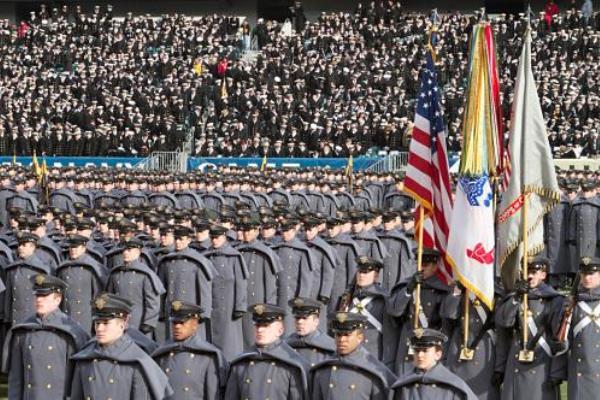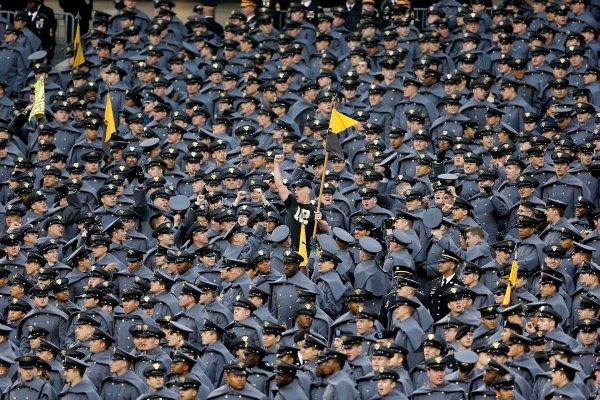The U.S. Naval Academy and U.S. Military Academy football teams have played each other since 1890 in what many call the best rivalry in college sports.
It's a rivalry that transcends sports in a lot of ways as soldiers and sailors across the globe will watch together on CBS at 3:00 p.m. EST on Saturday as the teams meet for the 115th time in Baltimore, Maryland.
The game is unique in that many of the senior players playing against each other Saturday will graduate this spring and will serve together in defense of the nation. Plenty of tradition and history have built up between the two academies as each student body will spend the entire week preparing for the game.
History
The first Army-Navy game occurred in 1890 when Army Cadet Dennis Mahan Michie agreed to play the Naval Academy after the Midshipmen issued the challenge. The Army team was new and the game was played at West Point with Navy blanking Army 24-0.
Three years later, Navy defeated Army at Annapolis and a post game argument between a Navy rear admiral and an Army brigadier general almost ended in a duel. President Grover Cleveland called a cabinet meeting that resulted in the Secretary of the Navy and the Secretary of War declaring that each team was restricted from playing one another at home and may not play each other.
In fact a Navy Midshipman wore what is regarded by many as the first ever football helmet the same game that almost resulted in a duel. His name was Joseph Mason Reeves and he went on to become an admiral and a major lead of the Navy's aircraft carrier fleet. He had been advised by a Navy doctor that any further trauma to his head would result in "instant insanity" or even death. He asked a local shoemaker to make him a helmet out of leather and the football helmet was born.
The suspension of the game lasted five years, from 1894-1898. In 1899, both sides agreed to play in Philadelphia, which is about halfway between West Point and Annapolis.
Other suspensions of the games were in 1909 when Army cancelled its season because of the death of one of their players during a game against Harvard. The game was put on hold in 1917-1918 for World War I and then again in 1928-1929 because of player eligibility reasons. However, the games have been played in continuity since 1930.
The teams have played 114 times with the Navy leading the series 58-49-7 to include Navy's most recent 12-game winning streak - the longest such streak in the rivalry's history.
Pre-Game Shenanigans
These days, the lead up to the game is often as intense as the game itself.
Units from across the globe, as well as Midshipmen and Cadets, produce videos called "Spirit Spots" and usually include a parody of some sort ending with the traditional call of "Go Army, Beat Navy!" or "Go Navy, Beat Army!" Popular past videos include a group of Midshipmen dancing to "Gangnam Style" and a recent Army spot featuring a one star general called "A Secret and Dangerous Weapon," which is a war tuba.
In the weeks leading up to the game, pranks are played on both sides. They range from stealing uniforms to dropping a helicopter full of ping pong balls on a formation of cadets at West Point. Both teams also have an active history of trying to steal each other's mascots.
The students at West Point traditionally try and steal the Navy's mascot, a goat named Bill. The Navy keeps two to three goats at a farm in Maryland.
Army has been overwhelmingly more successful in this endeavor than Navy. Cadets have succeeded in stealing Bill several times. In 1995, after a raid by the Army Cadets that resulted in three goats being taken, flag officers from both service branches issued official orders that the "kidnapping of Cadets, Midshipmen or mascots will not be tolerated."
In 2007, a group of cadets launched "Operation Good Shepherd" capturing the goats again, but this time recording themselves in the act and posting the video to You Tube. More recently in 2012, evidence the Army cadets had struck again was a lone goat tied up outside the Pentagon.
The Midshipmen were successful in 1991 when they stole the Army's mascot, a mule. A group of Navy Midshipmen disguised themselves as Army Cadets, went to Morgan Farms where the mules are kept, bound the veterinarian staff, and loaded the mules onto a trailer.
Like any sports team, superstition plays a role. The Midshipmen of the 13th company traditionally run the game ball from Bancroft Hall to the site of the game. The tradition started in 1982 because of a desire to get the "unlucky" company off the campus grounds so close to the game.
A group of West Point Cadets will also deliver a game ball in Baltimore after making the trek by foot from West Point.
Game Day
On game day the ceremony begins with one of the most impressive traditions known as the "march on." The Corps of Cadets and the Brigade of Midshipmen each march onto the field hours before the game. It is a visually stunning occurrence with lines of gray suited Cadets or blue-coated Midshipmen filling the football field. Once they have completed their march on, the students take their spots in the stadium seats for the game.
Several Midshipmen and Cadets experience all of the pre-game pranks and traditions in enemy territory. During their third year, some Midshipmen and Cadets spend a semester at the rival academy until the day of the game when they are returned to their home academy during what is known as a "prisoner exchange."
Game day itself is a show of pageantry and enthusiasm with many senior officials in attendance.
Theodore Roosevelt was the first president to attend the game in 1901. He was also the president to start the tradition of the president or secretary of defense crossing the field at halftime to make sure the leader sat on both sides during the course of the game.
Dwight G. Eisenhower was the only U.S. president to play in the game, which he did in 1912. The only other U.S. president to attend one of the service academies was Jimmy Carter. He graduated from the Naval Academy in 1947.
Perhaps one of the most emotional games occurred in 1963 when President John F. Kennedy, who was a Navy hero in WWII, was assassinated just eight days before the game, which he had planned on attending. Kennedy attended the game in 1961 and 1962 and was responsible for initiating the practice of having the Commander-in-Chief hold the pre-game coin toss. The game in 1963 was postponed for a week at the request of former First Lady Jacqueline Kennedy, who felt it was important for the game to go on as a "fitting tribute" to her husband.
In 2001, the game took place less than three months after 9/11. The competition took on a different meaning with the common knowledge that many who would graduate in the years to come would be going to war.
Since 9/11, 95 graduates of the U.S. Military Academy at West Point, New York, and 16 from the Naval Academy in Annapolis, Maryland, have been killed in Iraq and Afghanistan.
At the end of the game one of the most honored traditions is demonstrated. The two teams join together and sing the losing team's alma mater as a sign of respect. The two teams then move to stand in front of the winning team's student body and serenade them with their alma mater.
Back in 2011, while trying to stop the Navy's winning streak the team had a saying sewn inside their jerseys which read, "Sing Second," in reference to the order of school songs that are sung at the conclusion of the game. Singing second would mean that Army had won the game.
The tradition is called "honoring the fallen" and demonstrates a respect for all players of the game and a show of sportsmanship unlike any seen in college football. It is also a reminder that while competition has its place on the football field, all of the students are one team as a part of the U.S. military.
Lesser Known Traditions
While many know about the "march on" and traditions they see on the field, each side has a host of other lesser known traditions surrounding the game.
One such tradition is a night of liberty for the winning team and their fellow students. A night free of structure and homework is much appreciated by students who have virtually every minute of their day filled with training and academics.
At the Naval Academy, wins over Army earn "carry on" for the remainder of the semester for first year students known as plebes. This means they no longer have to adhere to strict physical movements like squaring off corners while walking on the campus grounds, and are free from "come arounds" which is the slang term for the twice-daily, 30-minute indoctrination sessions consisting of interrogations by the upperclassmen on all aspects of required professional knowledge, and physical exercise as punishment for incorrect answers.
Plebes also get to suspend "chow calls" which means standing in a pre-arranged spot in the company area and yelling at the top of their lungs the menu for the noon meal, the professional topic of the week, and major events on the yard while their senior classmates watch and eagerly wait for a mistake.
At West Point, due to the proximity of the game's date to Christmas leave, many Fourth Classes were permitted to sit "at ease" for all meals until Christmas leave if Army wins. That includes being able to eat without the strict order of motions they are normally required to perform.
In 1998, when Army defeated Navy, the plebes were permitted to have their rooms in PMI inspection condition all day until Christmas leave. PMI inspection condition means that their wardrobe doors may be closed, there may be some trash in the trash cans, and a small amount of dust would be tolerated.
A Navy win also calls for the ringing of two bells on the steps of Bancroft Hall. One is the ship's bell from the aircraft carrier USS Enterprise, World War II's most decorated ship. On game day it is rung continuously, from the time the final score of the game is known until the team returns to Bancroft Hall.
The other bell that is rung only if Navy defeats Army - is the Japanese Bell. The tradition began in 1900, after Navy had beaten Army, 11-7. The team's captain rung the bell to communicate the winning score.
The "Tecumseh" statue outside Bancroft Hall in known as the "God of 2.0," which is the grade needed to pass at the Academy. Prior to the game, the students paint the statue and render left handed salutes. Normally, a salute is rendered with the right hand but in sports a win is recorded in the left hand column of a ledger, hence the left handed salutes for good luck.
At West Point, the students in the lowest 5 percent academically must play in a football game on Thanksgiving morning. They are named the "Goats" in reference to the Navy mascot and intended as an insult as they play the "Engineers." Traditionally the top performers in each class choose engineering as their field of study. The game is said to predict the outcome of the Army-Navy game with the saying: "that as go the Goats, so goes Army against Navy."
The game itself is an American tradition and for many, a throwback to the "good old days" of college football where players played because they loved the game and bragging rights were the ultimate award. The increasing popularity of the game with the general public has also resulted in a stronger appreciation for the service academies and a better understanding of the kind of young military officer the country is producing.
The big question this year will be whether Navy can continue their 12-game winning streak. Many will speculate but regardless of the outcome, the traditions and history associate with the game will continue to mark this as one of the most time honored traditions in college football.
-- Sarah Blansett can be reached at SarahBlansett@monster.com































